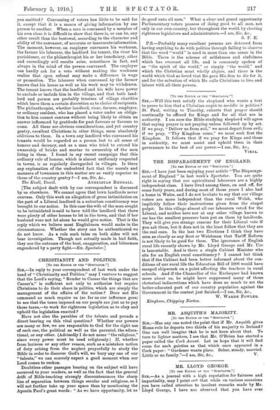• CHRISTIANITY AND POLITICS.
[TO THE EDITOR OP THE "SPECTATOR."]
Sin,—In reply to your correspondent of last week under the head of "Christianity and Polities," may I venture to suggest that the Lord's saying, "Render to Caesar the things that are Caesar's," is sufficient not only to authorise but require Christians to do their share in politics, which are simply the management of the affairs of the nation ? Does not His command as much require us (so far as our influence goes) to see that the taxes imposed on our people are just as to pay those taxes,—to work for righteous legislation as to obey and uphold the legislation enacted P Have not also the parables of the talents and pounds a direct bearing on this vital question ? Whether our powers are many or few, we are responsible to God for the right use of each one, the political as well as the parental, the educa- tional, or any other. (Advisedly I do not name "the religious," since every power must be used religiously.) If, whether from laziness or any other reason, such as a mistaken notion of duty arising from the neglect prayerfully to study the Bible in order to discover God's will, we bury any one of our "talents," we can scarcely expect a good moment when our Lord comes to reckon.
Doubtless other passages bearing on the subject will have occurred to your readers, as well as the fact that the general drift of Bible-teaching strongly discountenances the sharp line of separation between things secular and religious, so I will not further take up your space than by mentioning the Apostle Paul's great words : "As we have opportunity, let us
do good unto all men." What a clear and grand opportunity Parliamentary voters possess of doing good to all men, not only in our own country, but throughout the world, by electing righteous legislators and administrators.—I am, Sir, &c.,
S. F. E.
P.S.—Probably many excellent persons are deterred from having anything to do with politics through failing to observe that the word " world " is used in more than one sense in the Bible. There is the scheme of selfishness and sinfulness which has overcast all life, and is commonly spoken of as "the spirit of the world," or simply "the world," and which the Christian must wholly abjure, and there is the world which God so loved that He gave His Son to die for it, and for the salvation of which He calls Christians to live and labour with all their powers.










































 Previous page
Previous page